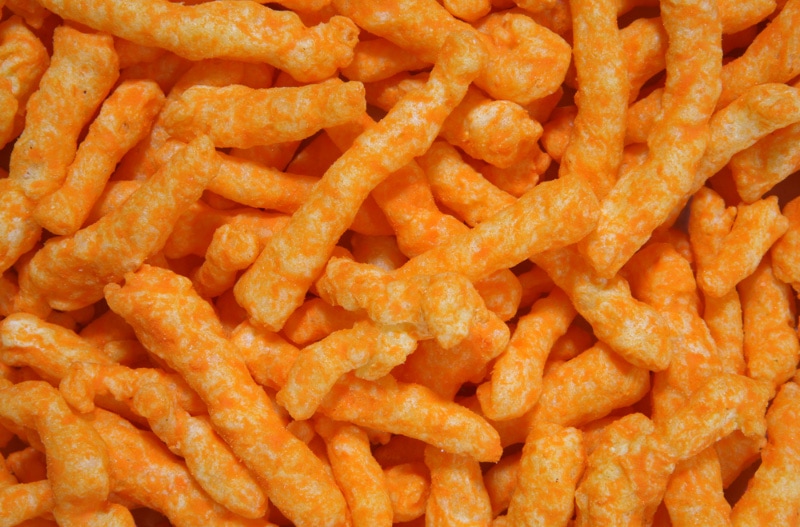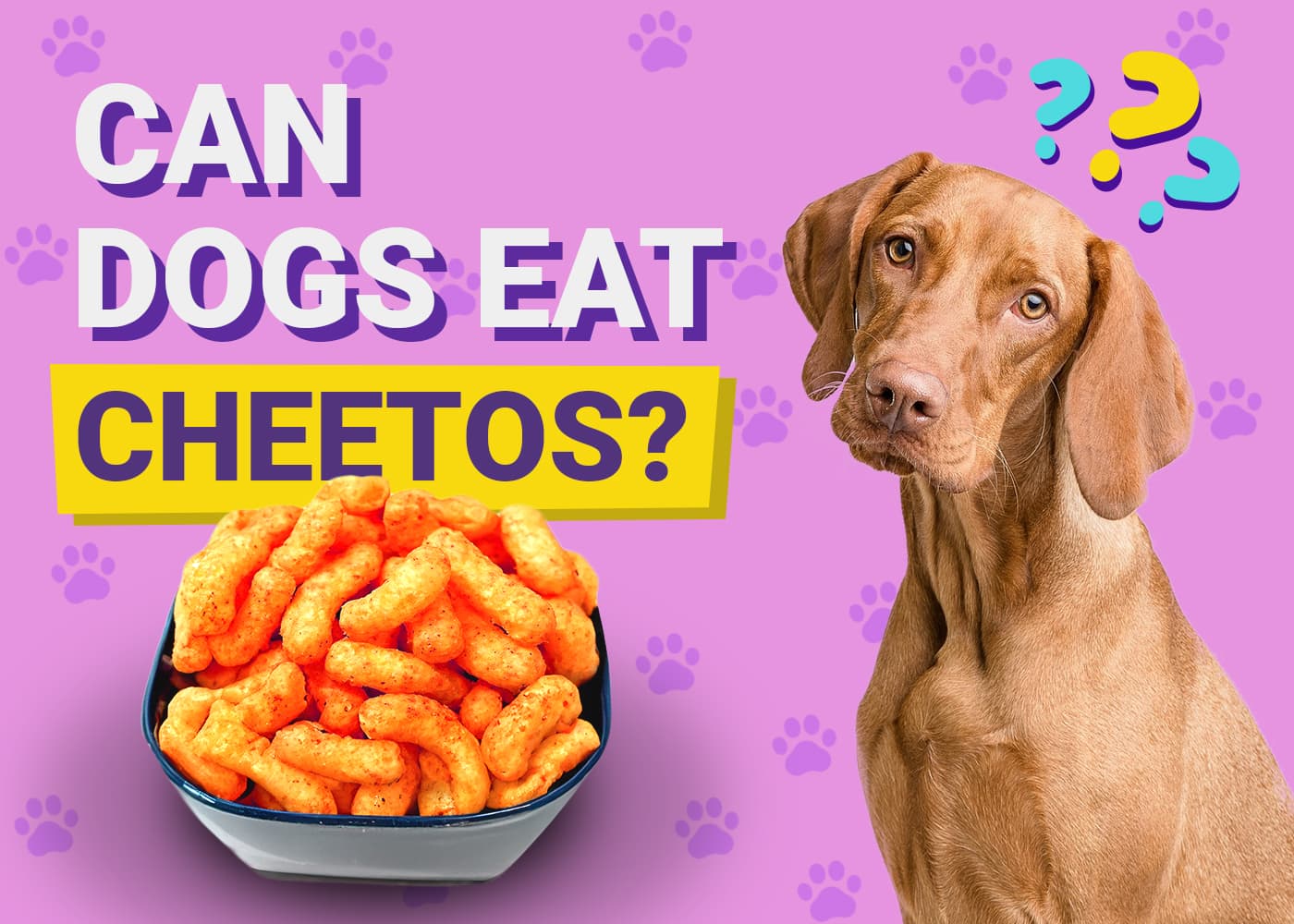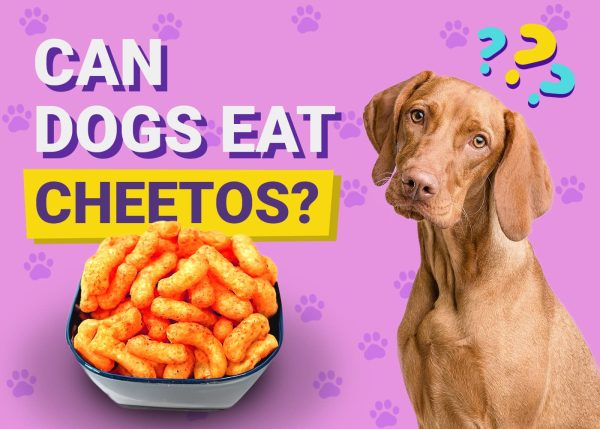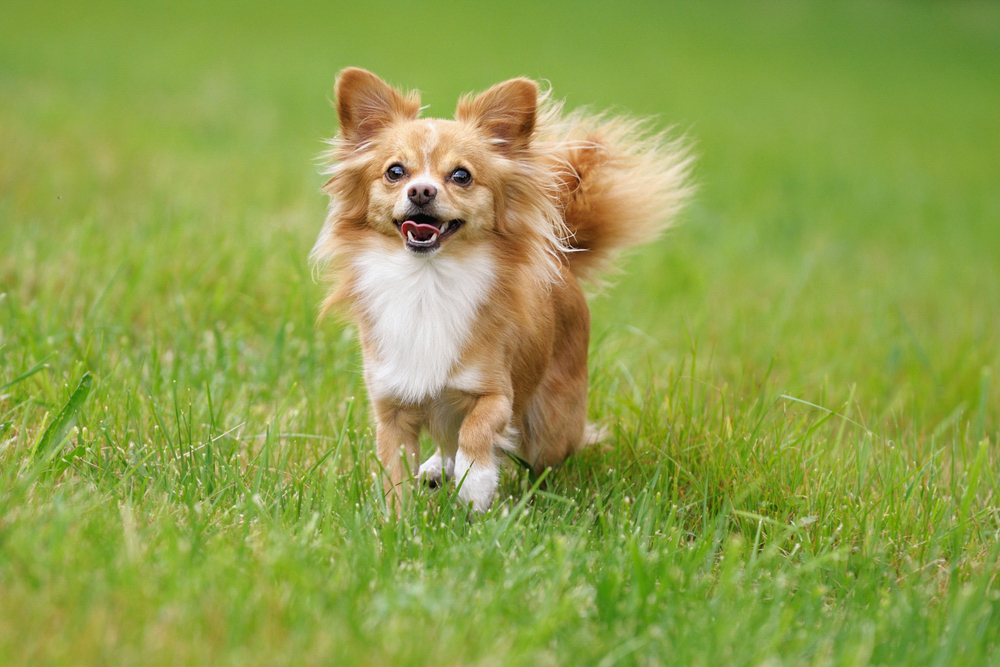Click to Skip Ahead
If you’re a dog owner, the chances are high that you’ve experienced something similar to the following situation. You finally get a chance to sit down and relax after a long day, and you take the opportunity to open a bag of Cheetos… only for your dog to stare at the bag with a pitiful, longing gaze. The guilt settles heavily in your heart, and you wonder if one little Cheeto would be so bad for your pup.
In the interest of your dog’s health, it is best to avoid junk food, including Cheetos. A single Cheeto shouldn’t hurt your dog, but you shouldn’t regularly offer Cheetos as a treat. If you want to know more about Cheetos and how they affect your dog, keep reading.
Cheeto Nutrition Facts
Cheetos are cheesy, crunchy snacks. There are several flavor varieties, but we will focus on the classic Cheeto for this article. The serving size of Cheetos is 21 pieces, and 21 pieces contain 160 calories. For more nutritional information, refer to the table below.
| Nutrient | Amount Per 21 Pieces |
| Calcium | 10 mg |
| Carbohydrate | 15 g |
| Cholesterol | 0 mg |
| Fat | 10 g |
| Saturated Fats | 1.5 g |
| Trans Fats | 0 g |
| Iron | 0.4 mg |
| Fiber | > 1 g |
| Potassium | 50 mg |
| Sodium | 250 mg |
| Protein | 2 g |
| Sugars | > 1 g |
| Vitamin D | 0 mg |
Equally important to the nutritional value of a food is the ingredients. When it comes to Cheetos, the ingredients aren’t that impressive.

Main Ingredients
- Enriched corn meal (corn meal, ferrous sulfate, niacin, thiamin mononitrate, riboflavin, folic acid)
- Vegetable oil (corn, canola, and sunflower oil)
- Cheese seasoning (whey, cheddar cheese, canola oil, maltodextrin, natural and artificial flavors, salt, whey protein concentrate, monosodium glutamate, lactic acid, citric acid, artificial color)
- Salt
The ingredients listed above contribute nothing to your dog’s health. If anything, they are more likely to harm them if your dog eats them frequently.
Why Are Cheetos Bad for Dogs?
Cheetos are bad for your dog because they lack essential nutrients and are high in fat and sodium. Below, we’ll discuss why the dairy and sodium in Cheetos aren’t suitable for your pup.
Dairy
Some dogs are lactose-intolerant, making dairy products a poor choice for your pup. However, some adult dogs can tolerate dairy, but a piece of cheddar or a small portion of milk is healthier than Cheetos. If your dog is lactose-intolerant and eats too many Cheetos, they can experience vomiting, diarrhea, or other gastrointestinal issues.
Sodium
Salt is not strictly unhealthy for dogs and is essential to the function of vital organs. However, your dog gets enough salt from commercial dog food, so there is no need to supplement their diet with salty snacks. If your dog eats too much salt, they can experience salt toxicity. In minor cases, this can cause gastrointestinal distress, such as diarrhea and vomiting. In severe instances, your dog may experience tremors, seizures, and death. Therefore, salty snacks should stay in the bag and out of the dog bowl.
Feeding Human Food to Your Dog Can Cause Issues
Besides resulting in health issues, feeding your dog human food can create numerous complications. The most notable problem you may face is behavioral issues. The more you indulge your dog’s desire for human food, the greater the problems become.
Behavioral Issues
You may give your pet a Cheeto, fully expecting it to be a one-time thing, but your dog will have other plans. Once you’ve opened the floodgates, your dog will never forget that there is a possibility that you may serve tasty human treats. Any time you open a bag of snacks and sit down for a meal, your dog may beg or engage in other undesired behaviors until they get what they want.
Once you give in, you reinforce the bad behavior, ensuring that they will continue doing it in the future. Habits like these are difficult to break in dogs, so the best way to prevent them is to avoid them entirely; don’t give your dog human food.
Pickiness
Pickiness is another issue that may rear its ugly head if you feed your dog human food. If you give your dog too much human food, they can become so accustomed to it that they no longer want to eat healthier, canine-specific food. This is a serious issue that can lead to nutritional imbalances over time, contributing to greater health issues.
Overall, the problems with feeding Cheetos and other human snacks to your dog are not worth the headache and hassle. Therefore, it is best to stick to feeding your dog canine treats and meals.
FAQs About Feeding Cheetos to Your Dog
In this section, we will review some frequently asked questions related to the subject.
Are Cheetos Toxic for Dogs?
If your dog sneaks a bite of a classic Cheeto, there is no need to panic; classic Cheetos are not toxic to dogs. However, check the ingredients of any flavored Cheetos you bring home. Some contain garlic powder, which is extremely dangerous for dogs.
Which Human Foods Can You Feed Your Dog?
While canine food is generally best for your dog, there are some human foods that you can serve in moderation. Animal-based proteins such as chicken, beef, and fish are healthy options for your pet as long as they are plain and unseasoned. Besides meat, there are other foods that your dog can safely munch on. Some of these include:
- Coconut
- Corn
- Eggs
- Honey
- Peanut butter (without xylitol)
- Peanuts
- Plain, air-popped popcorn
- Quinoa
When considering a new food for your dog, always consult your vet and introduce unfamiliar meals to your pet slowly.
What to Do if Your Dog Eats a Cheeto?
If your dog eats a Cheeto, your response will vary depending on the situation. If your dog ate a classic Cheeto, there is likely no cause for concern. You must determine how much your dog ate and their size to estimate how it will affect them.
Observe your pet for signs of distress, such as pain, vomiting, or diarrhea. If you notice any of these signs, contact your vet. If your dog ate a Cheeto flavored with a harmful ingredient, contact your vet or the pet poison control center immediately.
PangoVet. It’s an online service where you can <b>talk to a vet online</b> and get the personalized advice you need for your pet — all at an affordable price!
</p>
<div class="su-button-center"><a href=https://www.dogster.com/dog-nutrition/"https://pangovet.com/?utm_source=dogster&utm_medium=article&utm_campaign=dog_eat_drink%22 class="su-button su-button-style-default" style="color:#FFFFFF;background-color:#FF6600;border-color:#cc5200;border-radius:9px;-moz-border-radius:9px;-webkit-border-radius:9px" target="_blank" rel="nofollow"><span style="color:#FFFFFF;padding:0px 24px;font-size:18px;line-height:36px;border-color:#ff944d;border-radius:9px;-moz-border-radius:9px;-webkit-border-radius:9px;text-shadow:none;-moz-text-shadow:none;-webkit-text-shadow:none"> Click to Speak With a Vet</span></a></div></div></div>"}" data-sheets-userformat="{"2":513,"3":{"1":0},"12":0}"> If you need to speak with a vet but can’t get to one, head over to PangoVet. It’s an online service where you can talk to a vet online and get the personalized advice you need for your pet — all at an affordable price!

Final Thoughts
Cheetos, like all other salty human snacks, are not appropriate for your dog to eat. Although they don’t contain toxic ingredients, they’re nutritionally deficient. They are junk food for humans, so you can imagine how much worse they would be for dogs! If you want to treat your pet, it is best to stick to canine-safe options such as dog treats or healthy, nutritious foods.
Featured Image Credit: Alesia.Bierliezova, Shutterstock











